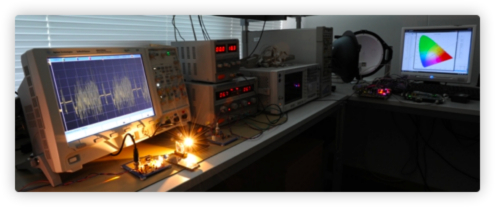PASTA-2 Receives £1.2m Funding from EPSRC
The Engineering and Physical Sciences Research Council has announced funding of 1.2m over three and a half years for the PASTA-2 project. PASTA-2 is a new collaboration between researchers in the School of Informatics and the School of Engineering and Electronics at Edinburgh University, led by Prof Nigel Topham.
 Joint research will shed new light on broadband communications. (Image Copyright © Peter Tuffy)
Joint research will shed new light on broadband communications. (Image Copyright © Peter Tuffy)
The overall objective of the PASTA-2 project is to investigate new and novel methods of automating the design of embedded systems to enable the timely creation of future generations of high-performance low-power digital appliances. This is an ambitious project, which brings together research in microprocessor design, software, signal processing, and an economically-important emerging application area.
"Embedded processors are an integral part of our everyday lives; from smart phones to wireless communications and bio-medical devices, future devices will require much higher performance than we have today, but their energy efficiency has to improve, as battery-life is critical".
Prof Nigel Topham
PASTA-2 Project Leader- School of Informatics at Edinburgh
"Performance cannot be increased simply by clocking devices at a higher frequency, future embedded systems will contain many processors working together in more energy-efficient ways. This presents a major challenge to the way software is created for these systems."
Prof Mike O'Boyle
Co-Investigator in the project
The overall objective of this project is to investigate new and novel methods of automating the design of embedded systems to enable the timely creation of future generations of high-performance low-power digital appliances.
This is an ambitious project, which brings together research in microprocessor design, software, signal processing, and an economically-important emerging application area.
"There is now strong evidence, from our prior work and from others, that 'machine learning' can provide a fast track to explore the vast range of possible designs for both the microprocessor and its software; this is a critical requirement for efficient design of future embedded systems".
Dr Bjoern Franke
Co-Investigator in the project
A key aspect of this project is the synergy between new design methods and an emerging application; in this case LED-based Visible Light Communication.
"The use of LED lighting is growing rapidly, due its low energy consumption", says Prof Harald Haas, leading the project in the School of Engineering and Electronics at Edinburgh, "LED light can also carry digital information at broadband speeds. However, this presents a major computational challenge, which we aim to address in this project using dynamically adaptable multi-core systems.
Prof Harald Haas
Project Leader- School of Engineering and Electronics at Edinburgh




